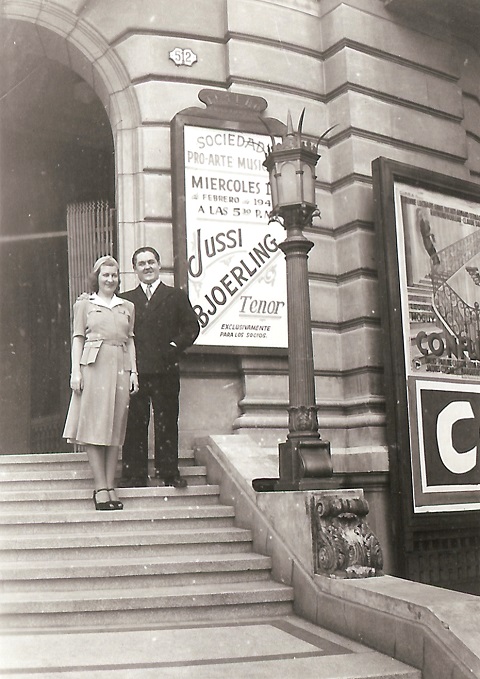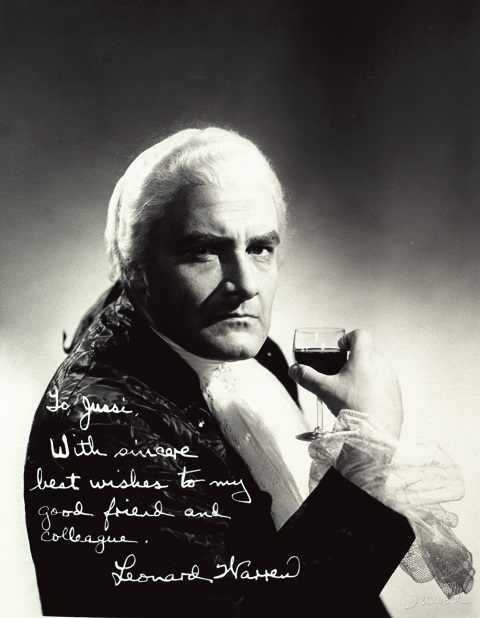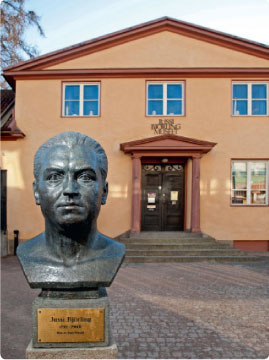Jussi of the Month April 2018
When the war was over in 1945, Jussi and his agent were ready to start reconquering the American audiences, and it was a larded touring schedule Jussi and Anna-Lisa had before them when they in the beginning of October left Sweden. It was on 27 February 1941 that Jussi took farewell of the US with a performance of Rigoletto at the Metropolitan, and little did he anticipate then that it would be more than 4½ years before he could return. When he was back on the Metropolitan stage at the end of November it was again as the Duke in Rigoletto, but then he had already almost two months’ touring behind him.
And the travelling in all directions across the American continent continued during 1946, as far as the middle of May with concerts and opera performances sometimes every second evening. One week he was in Canada, the next week he was in Texas or California. There, in Fresno “we experienced a little adventure”, Anna-Lisa related in a newspaper article. “We awoke in the middle of the night from the whole house shaking. It was a real earthquake, albeit luckily a relatively small one.” She also remembered “a car journey through the famous Sequoia Forest, where we also had lunch in a gigantic Sequoia tree.”
After that they travelled even further southwards, to Havana in Cuba. Jussi had been there as early as 1940, singing at Teatro Auditorio and now he returned for another two concerts at the same venue.

Anna-Lisa and Jussi Björling in Havanna 1940
It was in early April, but even then there was a terrible heat and “poor Jussi” was suffering enormously when he had to sing in tails and starched collar, Anna-Lisa remembers in her book about Jussi. On top of that Anna-Lisa herself had a miscarriage and was taken to hospital. There she felt abandoned, no one to talk to since she didn’t know any Spanish, and nothing to read in Swedish or English, so her only reading was the touring schedule. It was of course extensive and she soon knew it by heart. Luckily she recovered quickly and Jussi could carry through his concerts as planned.
“The concert audience in Havana was a real adventure”, she later said in an interview. “We knew that the Latin Americans are fiery, but this surpassed our wildest dreams. The men jumped up on the chairs, shouting and applauding, while the women threw flowers and blew kisses towards a blushing Jussi, who afterwards said, that he felt like a matador, after the bull had had the deathblow.”
I suspect that Edgardo Martin, music critic of Noticias Sociales, didn’t jump on his chair, but he still expressed his admiration in a more well-mannered fashion: “Yes, Jussi Björling is a great singer; one of the few singers whose fame has spread through gramophone records and radio broadcasts from theatres, because Björling is an opera tenor. He is operatic in his technique and his style and even in the tone of his voice. A voice which is beautiful, powerful, steady and agile …”
“Björling is a serious artist; honest in his interpretations with an outstanding capacity as dramatic tenor. His voice is not very rich in expressive modulations … but it is a voice which sings, and sings intensely… without giving too much space for sentimental expansion, which is really seldom justified in good music – and in music which is not so good … as opera singer he sings within a normal dramatic style; however, no groaning nor phrases cut abruptly as if to boast about the enormous effort: no plaintive vocalizations to bring tears out of time … It is so pleasant to hear singers who do not commit foolish acts.”
Another newspaper, El Pais, had an unsigned article that also hailed the great Swede (Edgardo Martin in Noticias Sociales mentioned above, had imagined that Jussi was Finnish, probably because of the name). “Björling is a great opera tenor. He has a marvellous voice and an even more wonderful technique. He sings with the affluence of those who understand and feel the bel canto.” The writer put Jussi on the same level as Caruso, Gigli, Lauri Volpi and Martinelli, “each one with the special quality of their voice, but all such great singers, great interpreters.”
Clotilde Pujol on the English-language Havana Post was also exuberant: “From the moment Björling rendered the first number of the program – Beethoven’s Adelaide – one witnessed the performance of the experienced artist. The versatility of expression of the singer was palpable in his rendition of Ingemisco from Verdi’s Requiem … Though the audience had applauded warmly each of the numbers rendered, the applause became a frenzied ovation when the artist interpreted Mascagni’s Addio alla madre for the tenor’s powerful tones rang out in splendorous beauty … Precision of pitch, fine control of voice, technical ability, excellent breathing and tones that are powerful and forceful as well as interpretative power were evident in a rendition that was ever artistic.” Also Clotilde Pujol noted “the prolonged ovation and shouts of bravo and enthusiastic applause that greeted the artist” after each encore.
Click here to listen to Beethoven’s Adelaide recorded 1939
The stay in Havana also offered scope for some private entertainment, among other things a visit to the famous night club Tropicana, where the couple treated the guests to both tango, rumba and conga with some Nordic flavour.
But new obligations waited in New York. On Monday 15 April Jussi appeared in Voice of Firestone and since Easter was approaching Jussi’s repertoire was adjusted to that. He sang Gounod’s O Divine Redeemer and Sanctus from the Cecilia Mass and Schubert’s Die Allmacht, opening with the words “Gross ist Jehova. This song was performed together with the Firestone Chorus.
Only two days later he sang his first Un ballo in maschera for the season at the Metropolitan. Leonard Warren was Renato and Zinka Milanov Amelia and in the pit was Bruno Walter.

A dedicated photo from Leonard Warren, ”To Jussi, with sincere best wishes to my good friend and colleague”
New York World – Telegram was there and noted that the leading figures of the newly founded United Nations were in the audience and saw a parallel between stage and auditorium: “An Austrian conductor, a Swedish tenor, a Yugoslavian soprano, an Italian, a Canadian, a Hungarian, an Englishman and one or two native Americans were on stage, in other words: one set of the United Nations sang last night and another was listening.” The reporter also had a feeling that “Bruno Walter led as if Giuseppe Verdi were looking over his shoulder; or as if The Masked Ball was going to help solve the next problem on the UN agenda.”
On 20 April Jussi was again on the MET stage, this time as the Duke of Mantua in Rigoletto. Leonard Warren sang the title role and as Gilda was heard Josephine Antoine, a today rather unknown coloratura soprano, but she debuted at MET as early as 1936 and sang 76 performances there during a 12-year-period.
After a concert in Clemson, South Carolina on 23 April, Jussi arrived two days later at Knoxville, Tennessee, where other music genres than Jussi Björling’s were in vogue. Knoxville News-Sentinel reported in a preview: “In the hometown of Roy Acuff* and Cas Walker**, Jussi Björling, world famous Swedish concert tenor, admitted with some abashment yesterday that he had ‘never heard any hillbilly music’***. And – wonders of wonders - the great concert tenor didn’t even know the meaning of the term ‘hillbilly music’, until a nosey reporter gave a detailed explanation.” Knoxville Journal had the music journalist Malcolm Miller in the audience and he could report that “resounding applause and calls from the audience brought him back for five encores … Although Björling’s voice is essentially robust, he produced tones of glorious lyricism, spun to the fineness of golden gossamer. He disclosed marvellous breath control and finished histrionism … A voice with a tear in it in Addio alla madre …He sang in German, Italian, French, Swedish and English. His English pronunciation had only a slight accent … he even sounded the ‘J’ in ‘Jeannie!’
Click here to listen to Mascagni’s Addio alla madre recorded 1944
Before April turned to May he also got to sing his signature role, Rodolfo in La Bohème, which happened on 28 April at a guest appearance from the Metropolitan at Cleveland Public Hall. His Mimì was, as several times later, Licia Albanese, but this was the first time the two performed together.

Licia Albanese, John Brownlee and Jussi in La Bohème 1948
Francesco Valentino was Marcello. He later foreshortened his first name to Frank and sang more than 400 performances at the MET during a period of 21 years. The response from the press was enthusiastic and Cleveland Press wrote: “Tenor Björling, known to Clevelanders through radio and records, made a tremendous impression with his full, round, resonant voice and his interpretation of the part of Rodolfo…”
But Jussi was not the only Swedish singer in Cleveland during this week’s guest appearance from the Metropolitan. Aftonbladet could under the header “Swedish Week in Cleveland” report that, besides Jussi also Kerstin Thorborg and Torsten Ralf appeared there. They sang in a broadcast concert and also in a performance of Wagner’s Tannhäuser, where in particular Ralf in the title role got glorious reviews in the local press.
Footnotes:
* Roy Acuff (1903 – 1992) singer, known as “The King of Country Music”
** Cas Walker (1902 – 1998) business man who in 1929 started a radio show to launch his products but where he presented artists like Ray Acuff, Bill Monroe and Chet Atkins and in the 1950s, when the show was seen on TV, he launched among others a ten-year-old Dolly Parton and the Everly Brothers.
*** Hillbilly was until the 1950s the prevalent term for country music.
Göran Forsling




